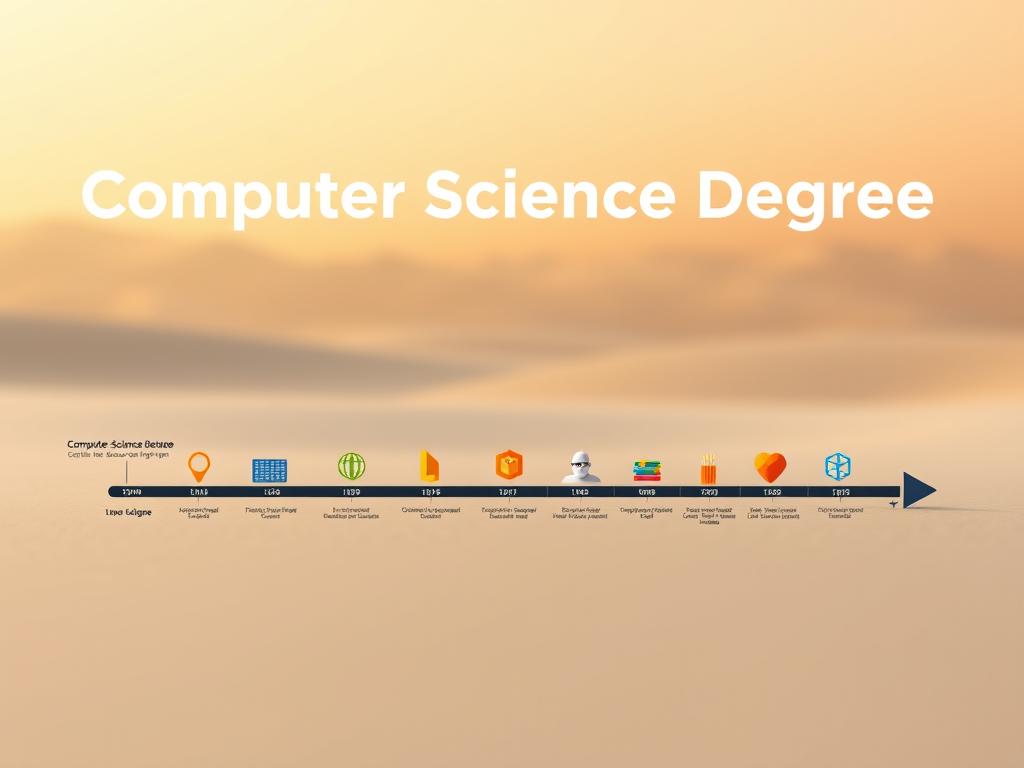How Long Does It Take to Study Computer Science?
A computer science degree opens doors to technology and innovation. Students often ponder the study duration and potential careers in this fast-paced digital field1.
Most computer science programmes take four to five years to complete. Students typically need about 120 credits to graduate1. This educational path leads to numerous high-paying tech industry jobs1.
The tech sector is booming, with impressive job growth across various specialisations. Software developer roles are set to increase by 25%1. Information security analysts may see a 35% growth over the next decade1.
Computer science and IT professionals earn a median annual wage of £97,430. This is much higher than the national median of £45,7601. Such lucrative prospects make a computer science degree an attractive option2.
Students can choose from diverse concentrations to suit their career goals. These include Artificial Intelligence, Cybersecurity, Game Design, Robotics, and Software Engineering2.
Understanding Computer Science Education Pathways
Computer science education offers various academic routes for aspiring tech professionals. Computer science programmes provide multiple pathways to develop skills and knowledge3. These paths cater to different career goals and learning preferences.
Associate Degree: Your First Step
An associate degree is an excellent entry point into computer science. It typically takes two years to complete. This pathway offers a foundational understanding of core computing concepts4.
Community colleges play a crucial role in computer science education. In fact, 45% of U.S. undergraduates start their academic journey at these institutions5.
- Typical duration: 2 years
- Core curriculum: 42 hours
- Pathway-specific courses: 18 hours
Bachelor’s Degree: Expanding Your Expertise
A bachelor’s degree in computer science is a four-year programme. It delves deeper into technological skills. Students develop competencies in algorithms, software development, and programming languages3.
The job market for computer science graduates is expanding rapidly. It’s projected to grow by 21% from 2021 to 20313.
Advanced Degrees and Specialisations
Master’s and PhD programmes offer specialised pathways for advanced knowledge. A master’s typically takes 18 months to two years. A PhD programme extends to four or five years.
Interestingly, 60% of PhD computer scientists find jobs in industry. Only 30% pursue academic careers3.
By 2024, nearly 4.6 million high-wage jobs will be available in computer science and related fields5.
Each educational pathway builds upon the previous one. They offer increasingly sophisticated knowledge and expand career opportunities. The dynamic world of technology provides numerous options for growth and specialisation.
Why Choose Computer Science as a Career Path
Computer science careers offer exciting prospects with huge growth potential. The tech industry keeps expanding, creating fantastic opportunities for skilled professionals in various areas67.

Professionals in this field can explore diverse career paths across multiple disciplines:
- Software Development7
- Cybersecurity7
- Artificial Intelligence Research7
- Human-Computer Interaction7
- Network Systems Management7
The job outlook for computer science is bright. Employment is expected to grow by 15% from 2019 to 20296. Professionals can earn competitive salaries, with the median annual wage reaching £126,830 in May 20206.
| Career Level | Potential Roles | Median Salary |
|---|---|---|
| Entry-Level | Software Developer, IT Technician | £93,0008 |
| Mid-Level | Data Scientist, Software Engineer | £130,1608 |
| Senior-Level | Solutions Architect, IT Director | £169,5108 |
Computer science careers offer more than just financial rewards. Professionals can make significant technological contributions that positively impact society7.
Success in this dynamic field requires critical skills. These include analytical thinking, problem-solving, and teamwork7.
How Long to Study Computer Science: Complete Timeline
CS study timelines vary based on educational paths and career goals. Degree durations range from short certificates to extensive academic programmes9. Knowing these timeframes helps tech professionals plan their academic journey effectively.
- Associate Degree: 2 years of foundational learning10
- Bachelor’s Degree: Standard 4-year programme10
- Master’s Degree: Approximately 18-24 months of advanced study
- Doctoral Programme: 4-5 years of specialised research
Mastering computer science basics can take six months to several years9. The duration depends on prior experience, learning style, and personal commitments.
Study mode (full-time or part-time) also affects the timeline. Targeted programmes can speed up learning considerably.
- Prior programming experience
- Learning style
- Personal commitments
- Study mode (full-time or part-time)
Noble Desktop’s Web Development Certificates can be completed in 14 to 17 weeks full-time9. Part-time options take seven to ten months.
The key is consistent learning and adaptability in the dynamic field of computer science.
| Programme Type | Duration | Key Focus |
|---|---|---|
| Associate Degree | 2 years | Foundational Skills |
| Bachelor’s Degree | 4 years | Comprehensive Technical Knowledge |
| Master’s Degree | 1-2 years | Advanced Specialisation |
| PhD Programme | 4-5 years | Research and Expertise |
A computer science degree is an investment in future career opportunities10. The field is growing rapidly, with promising job prospects.
The Bureau of Labor Statistics projects a 21% growth in computer science jobs from 2021 to 20319. This makes the educational pathway increasingly valuable for aspiring professionals.
Essential Skills and Course Components
Computer science education covers a wide range of skills for tech careers. Students gain expertise in programming and software development through rigorous training. The curriculum focuses on building essential skills in technology for professional settings1112.
Key programming languages like Java, Python, C, and JavaScript are central to software development learning. Students master these while developing crucial problem-solving skills. Continuous learning is vital as professionals must adapt to new technologies121113.
Technical skills go beyond coding into maths theory and system architecture. Understanding statistics, calculus, and linear algebra boosts analytical abilities. Data analysis and visualisation are increasingly important in AI and predictive analytics12.
Modern computer science education balances hard and soft skills. Technical expertise is crucial, but employers also value communication and teamwork. This approach prepares graduates for the complex challenges in technology careers1112.
FAQ
What is computer science and why is it important?
Computer science delves into computational systems, technology, and programming. It drives innovation across various industries, from healthcare to finance. This field enables professionals to develop cutting-edge solutions and advanced software applications.
Computer science transforms how we live and work. It’s crucial in today’s digital landscape, shaping our future through technological advancements.
How long does it typically take to complete a computer science degree?
The duration of a computer science degree varies. An associate degree takes about two years, while a bachelor’s degree requires four years.
A master’s degree ranges from 18 months to two years. PhD programmes typically span four to five years. Part-time or online options can change these timelines.
What career opportunities exist for computer science graduates?
Computer science graduates have diverse career prospects. Roles include software development, AI research, cybersecurity, network engineering, data science, and cloud computing.
The tech industry offers competitive salaries and global mobility. Graduates can contribute to technological advancements that positively impact society.
What programming languages should I learn?
Essential programming languages include Python, Java, C++, JavaScript, and SQL. Your educational programme and career goals will determine which languages you’ll learn.
Most computer science curricula introduce multiple languages. This approach provides students with versatile programming skills.
Do I need advanced mathematics to study computer science?
Mathematical skills are fundamental to computer science. Students typically study discrete mathematics, linear algebra, calculus, and statistics.
These mathematical foundations are crucial. They help in understanding algorithms, computational theory, and complex problem-solving techniques in computer science.
Can I study computer science online?
Many universities offer online computer science programmes at various levels. These options provide flexibility for students balancing work, personal commitments, and education.
Ensure the online programme is accredited. Check if it offers comprehensive practical training for a well-rounded education.
What skills are most important in computer science?
Critical skills include programming proficiency, algorithmic thinking, and problem-solving. Mathematical reasoning, system design, and communication skills are also vital.
Successful computer science professionals combine technical expertise with creativity. Continuous learning and adaptability are key in this ever-evolving field.
How competitive is the job market for computer science graduates?
The job market for computer science graduates is extremely robust. There’s high demand across multiple sectors for tech-savvy professionals.
The Bureau of Labour Statistics projects significant growth in technology-related jobs. Many roles offer competitive salaries and excellent career progression opportunities.
What’s the difference between computer science and software engineering?
Computer science is broader, focusing on computational theory, algorithms, and system design. Software engineering concentrates more specifically on designing, developing, and maintaining software systems.
Both fields are interconnected but have distinct focuses. They require different skill sets, though there’s considerable overlap.
Are there specialisation options within computer science?
Yes, computer science offers numerous specialisations. These include AI, machine learning, cybersecurity, data science, and network engineering.
Other areas are cloud computing, game development, and blockchain technology. Postgraduate programmes often allow deeper exploration of these specialised fields.
Source Links
- Bachelor’s Degree in Computer Science: A Guide
- What Is A Computer Science Degree? What Can You Do With It?
- How to Become a Computer Scientist
- Computer Science Pathway, A.S. | Perimeter College | Georgia State University
- Community college pathways to a four-year computer science degree
- Computer Science Career Path Guide
- Computer Science 101: A Complete Guide to Your New Career Path
- Why Computer Science Is a Good Major | BestColleges
- How Long Does it Take to Learn Computer Science?
- What Is a Bachelor of Computer Science? | Majors, Skills, and Cost
- List of Skills Needed for Computer Science | University of Phoenix
- The Computer Science Skills That Every CS Professional Needs
- Computer Science Skills: Definitions and Examples | NU















